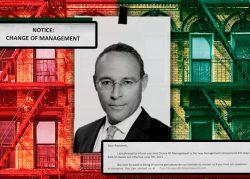A holdout tenant didn’t stop Naftali Group from filing permits last week to build 45 luxury units on the Upper West Side.
The filing lays out plans for a 16-story, mixed-use building at 215 West 84th Street. But now Mike Naftali’s firm has another problem: The holdout’s hard-charging lawyer is maneuvering to drag the developer into an anti-harassment program that could stall the project for a while.
Even if attorney Adam Leitman Bailey’s tactic is a long shot, it could improve his leverage to extract a sizable buyout for his lease-less client, Ahmet Ozsu.
The permit applications, for their part, don’t mean Naftali is any closer to ousting Ozsu. The tenant remains in possession of his penthouse apartment, which prevents demolition of the building and construction of its 155,000-square-foot replacement. Naftali has yet to file an offering plan for what is expected to be a condominium at the site, between Amsterdam Avenue and Broadway.
Bailey said an investigation into Naftali’s alleged harassment of Ozsu holds the potential to bar the firm from developing the site for several years. The lawyer said his firm is cooperating with the City Council as it investigates whether to place Ozsu’s building in a program that would require Naftali to first obtain a “certificate of no harassment.”
Under the program, prompted by allegations in 2018 against Kushner Companies and expanded by the city last year, distressed buildings or those with conditions that endanger tenants’ health or safety must obtain a certificate of no harassment for the city’s Department of Buildings to approve demolition.
Once the certificate is filed, the Department of Housing Preservation and Development analyzes the property’s tenant harassment history dating back five years. If the building comes up clean, the developer is good to build.
But if HPD digs up a history of harassment, it can open a case at the Office of Administrative Trials and Hearings. If a city judge agrees that the evidence shows harassment, the agency can deny the certificate, which could bar the building’s owner from getting a construction permit for at least three years.
Read more


It is unclear how frequently no-harassment certificates are required. Bailey’s claim that the city is considering placing the property in the program could not be independently verified.
Any building with at least six units — such as Naftali’s — where a court determined harassment occurred is eligible, according to the Coalition Against Tenant Harassment, a group that pushed for the law’s expansion.
Naftali has filed two lawsuits against Ozsu — a $25 million case seeking damages for delays and an eviction suit.
Counterclaims filed in the $25 million suit allege Naftali brought the case to “terrorize” Ozsu into vacating his home and to punish him for filing an emergency rental assistance application, which can provide up to one year’s protection from eviction.
A state judge earlier this month put off the case pending a housing court ruling on Ozsu’s right to possession.
In the eviction suit, Ozsu claims that Naftali installed a noisy air filter outside the tenant’s door that has prevented Ozsu from living and working in peace since early April.
Noting that Ozsu’s floor is the only one with a filter, Bailey’s firm argues that the developer installed it to “intentionally harass, vex, and retaliate against [Ozsu] for refusing to surrender possession of his apartment and/or accept a buyout.”
The backlog in housing court will likely drag out the eviction suit for months. Landlord attorneys say courts are still working through cases that predate the pandemic.
The tenant, whose lease has expired, turned down an initial $30,000 offer to leave his free-market unit, according to the New York Times. Ozsu is looking for a seven-figure payout, the developer claims in a legal filing.
Naftali did not comment on the possibility of being placed in the anti-harassment program.
Naftali’s lawyer, Y. David Scharf of Morrison Cohen, said in a statement: “We believe in the court system and the regulatory process that will vindicate the developer’s rights.”
